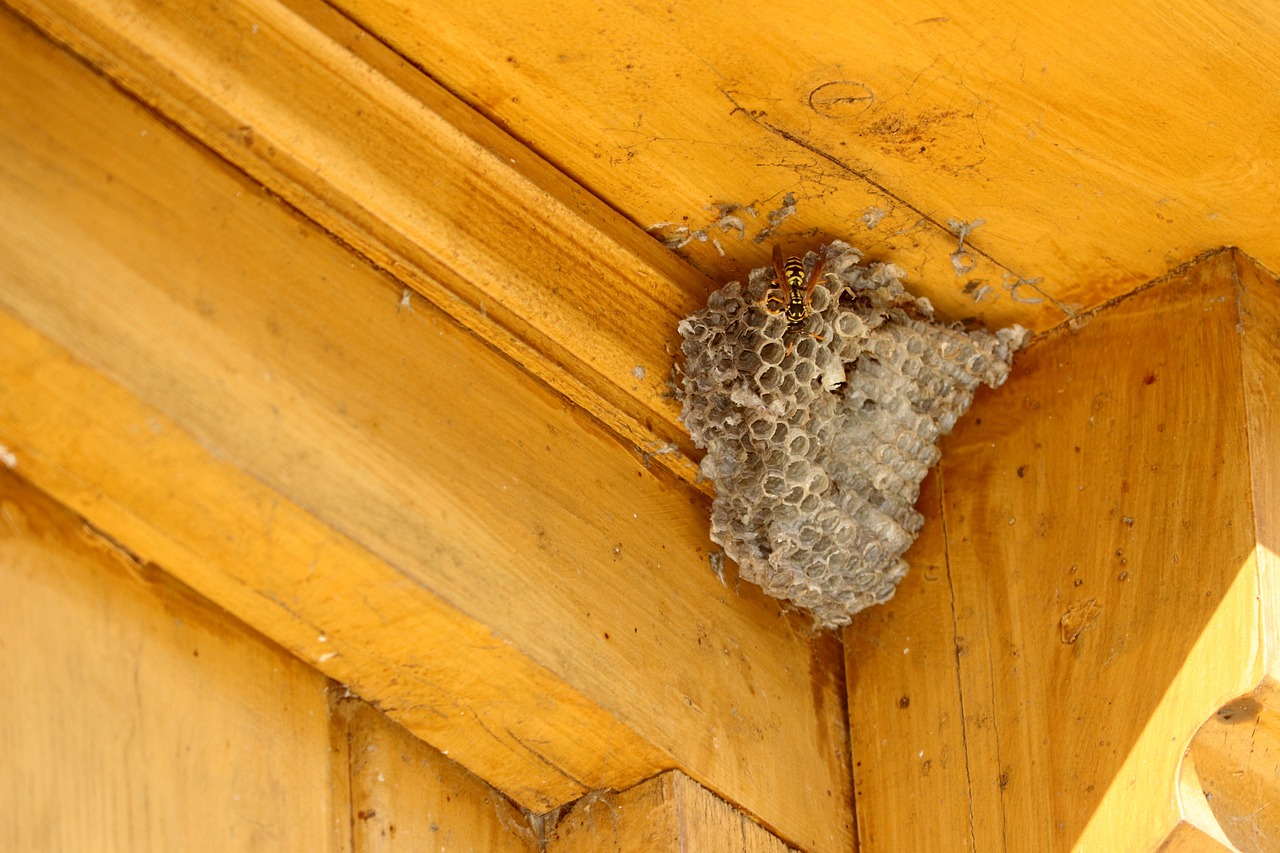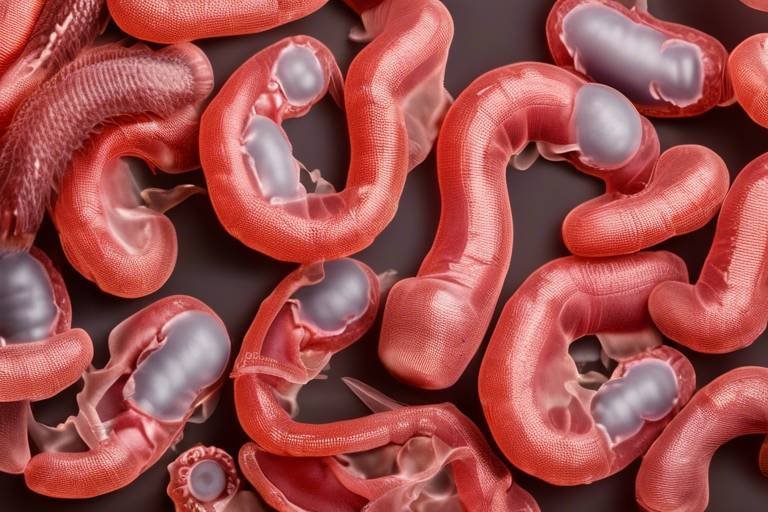Understanding the Importance of Regular Parasite Control
When it comes to the health of our beloved pets and livestock, regular parasite control is not just a good idea—it's essential! Imagine your furry friend, full of energy and happiness, suddenly becoming lethargic and irritable due to pesky parasites. These unwelcome guests can cause a range of health issues that may go unnoticed until it's too late. By understanding the significance of regular parasite control, you're not only protecting your animals but also ensuring their overall well-being.
Parasites can be likened to uninvited guests at a party; they sneak in, take over, and create chaos. From fleas and ticks that irritate the skin to internal worms that wreak havoc on the digestive system, the variety of parasites out there is alarming. This is why it's crucial to stay informed and proactive. Regular checks and treatments can make all the difference, allowing your pets to live their best lives without the discomfort that parasites bring.
Moreover, the health risks associated with parasites are not just limited to physical discomfort. They can lead to severe diseases that may require extensive veterinary care. By investing time and resources into parasite prevention, you're not only safeguarding your animals' health but also your wallet. Yes, it might feel like a chore to keep up with treatments and checks, but think of it as an investment in their happiness and longevity.
In the following sections, we will delve deeper into the various types of parasites that can affect your pets and livestock, the signs to look out for, and the preventive measures you can take. By the end of this article, you’ll be equipped with the knowledge to ensure your animals remain healthy, happy, and parasite-free!
Parasites can cause a range of health issues in animals, from mild discomfort to severe diseases. Understanding these risks is crucial for effective prevention and treatment.
Familiarizing yourself with the various types of parasites, such as fleas, ticks, and worms, helps in recognizing potential threats to your pets and livestock.
Fleas and ticks are external parasites that can lead to skin irritations and transmit diseases. Regular checks and treatments are essential for keeping pets healthy.
Identifying signs of flea and tick infestations early can prevent serious health complications. Look for excessive scratching, biting, or unusual behavior in pets.
Implementing preventive measures, such as topical treatments and regular grooming, can significantly reduce the risk of flea and tick infestations.
Internal parasites, such as worms, can affect the digestive health of animals. Regular deworming is important to maintain their overall health and wellness.
Consistent parasite control not only protects pets and livestock from health issues but also enhances their quality of life, leading to happier and more active animals.
Regular parasite control contributes to improved well-being by minimizing discomfort and preventing diseases, allowing pets to thrive in their environments.
Investing in regular parasite control can be more cost-effective than treating advanced infestations and health complications, ultimately saving money in veterinary bills.
Q: How often should I check my pets for parasites?
A: It's recommended to check your pets for parasites at least once a month, especially during warmer months when parasites are more active.
Q: What are the signs my pet may have parasites?
A: Common signs include excessive scratching, weight loss, vomiting, diarrhea, and lethargy. If you notice any of these symptoms, consult your veterinarian.
Q: Are there natural remedies for parasite control?
A: While some natural remedies may help, they are often not as effective as veterinary-recommended treatments. Always consult with your vet before trying any new treatment.

The Health Risks of Parasites
Parasites are more than just a nuisance; they can pose serious health risks to our beloved pets and livestock. These unwanted guests can cause a wide array of health issues, ranging from mild discomfort to life-threatening diseases. Imagine your furry friend feeling lethargic, scratching incessantly, or refusing to eat—these could be signs of a parasitic infestation. Understanding these risks is crucial for effective prevention and treatment, ensuring that your pets lead happy and healthy lives.
One of the most alarming aspects of parasites is their ability to multiply rapidly. For instance, a single female flea can lay up to 50 eggs per day, leading to an infestation in no time. This exponential growth can overwhelm your pet's immune system, resulting in severe health complications. It's not just the immediate discomfort that you should worry about; parasites can also transmit diseases that affect both animals and humans. For example, ticks are notorious for spreading Lyme disease, which can have long-lasting effects on your pet's health.
Moreover, internal parasites, such as worms, can wreak havoc on your pet's digestive system. These worms can rob your pets of essential nutrients, leading to weight loss, anemia, and even organ damage if left untreated. The symptoms of internal parasites can be subtle at first, making it easy for pet owners to overlook them. Therefore, routine check-ups and fecal examinations are essential to catch these invaders early.
In addition to the physical health risks, the presence of parasites can also affect your pet's mental well-being. Imagine feeling itchy and uncomfortable all the time; it would be hard to enjoy life, right? Pets suffering from infestations may become irritable, withdrawn, or aggressive. This change in behavior can strain the bond between you and your pet, leading to a less harmonious household.
To give you a clearer picture of the health risks posed by parasites, here's a quick overview of some common parasites and the potential health issues they can cause:
| Parasite | Health Risks |
|---|---|
| Fleas | Skin irritations, allergic reactions, tapeworms |
| Ticks | Lyme disease, Rocky Mountain spotted fever |
| Heartworms | Severe lung disease, heart failure |
| Roundworms | Nutritional deficiencies, vomiting, diarrhea |
| Hookworms | Anemia, lethargy, skin infections |
In conclusion, the health risks associated with parasites are significant and should not be taken lightly. Regular monitoring and proactive measures are essential to keep your pets and livestock safe from these harmful invaders. Remember, a little prevention goes a long way in ensuring a long, healthy life for your furry friends.

Types of Common Parasites
This article explores the significance of regular parasite control for pets and livestock, highlighting health benefits, prevention strategies, and the impact on overall well-being.
Parasites can cause a range of health issues in animals, from mild discomfort to severe diseases. Understanding these risks is crucial for effective prevention and treatment.
When it comes to the health of our beloved pets and livestock, understanding the is essential. These unwanted guests can wreak havoc on their health and well-being. By familiarizing yourself with these parasites, you can take proactive steps to protect your furry friends. Let's dive into the most common culprits.
Fleas and ticks are perhaps the most notorious external parasites. They not only cause skin irritations but can also transmit serious diseases. Fleas can lead to conditions such as flea allergy dermatitis, while ticks can carry Lyme disease and other tick-borne illnesses. Regular checks and treatments are essential for keeping pets healthy.
Identifying signs of flea and tick infestations early can prevent serious health complications. Look for excessive scratching, biting, or unusual behavior in pets. If you notice your pet constantly grooming itself or developing hot spots, it might be time to check for these pesky parasites.
Implementing preventive measures is key to keeping fleas and ticks at bay. Topical treatments, oral medications, and regular grooming can significantly reduce the risk of infestations. It’s like having a shield against these invaders! A routine check after walks in grassy areas can also help catch ticks before they latch on.
While external parasites are often visible to the naked eye, internal parasites like worms can be more insidious. These parasites can affect the digestive health of animals, leading to symptoms such as vomiting, diarrhea, and weight loss. Regular deworming is important to maintain their overall health and wellness. Just because you can’t see them doesn’t mean they’re not there!
Common types of internal parasites include:
- Roundworms: These are long, spaghetti-like worms that can cause malnutrition and gastrointestinal issues.
- Tapeworms: Often transmitted through fleas, these flat worms can lead to weight loss and discomfort.
- Hookworms: These can cause anemia and are particularly dangerous for young animals.
Regular fecal examinations by your veterinarian can help identify these internal threats. Early detection means early treatment, which is crucial for your pet's health.
Consistent parasite control not only protects pets and livestock from health issues but also enhances their quality of life, leading to happier and more active animals.
Regular parasite control contributes to improved well-being by minimizing discomfort and preventing diseases, allowing pets to thrive in their environments.
Investing in regular parasite control can be more cost-effective than treating advanced infestations and health complications, ultimately saving money in veterinary bills.
1. How often should I treat my pet for parasites?
Most veterinarians recommend monthly treatments for fleas and ticks, while deworming schedules can vary based on your pet's age, lifestyle, and risk factors.
2. Can parasites affect humans?
Yes, some parasites can be transmitted from pets to humans, posing health risks to people, especially children and immunocompromised individuals.
3. What are the signs my pet might have parasites?
Look for signs such as weight loss, vomiting, diarrhea, excessive scratching, or changes in behavior. If you notice any of these symptoms, consult your veterinarian.
4. Are natural remedies effective against parasites?
While some natural remedies may help repel parasites, they are often not as effective as veterinary-approved treatments. Always consult your vet before trying any home remedies.
Fleas and Ticks
Fleas and ticks are not just annoying little pests; they can wreak havoc on your pets' health and comfort. Imagine your furry friend, who usually bounds around with joy, suddenly scratching incessantly or acting lethargic. This could very well be the result of a flea or tick infestation. These external parasites are notorious for causing skin irritations, allergic reactions, and even transmitting serious diseases. It's essential to stay vigilant and proactive in managing these threats to ensure your pets remain happy and healthy.
When it comes to fleas, these tiny insects can reproduce at an astonishing rate. A single female flea can lay up to 50 eggs per day, leading to an infestation that spirals out of control in no time. Ticks, on the other hand, can latch onto your pet and feed on their blood, potentially transmitting diseases like Lyme disease and Rocky Mountain spotted fever. Both of these parasites thrive in warm, humid environments, which means your home and yard can quickly become a breeding ground if you're not careful.
So, how can you recognize if your pet is suffering from a flea or tick infestation? Here are some common signs to look out for:
- Excessive Scratching: If your pet seems to be scratching or biting at their skin more than usual, it could indicate the presence of fleas or ticks.
- Red or Irritated Skin: Look for any signs of redness, swelling, or irritation on your pet's skin.
- Flea Dirt: This is essentially flea feces, which looks like tiny black specks. If you see this on your pet's fur, it's a clear sign of fleas.
- Unusual Behavior: If your pet is acting restless or seems to be in discomfort, it might be due to these pesky parasites.
To combat these nuisances, regular checks and treatments are crucial. Implementing a consistent parasite control regimen can make a world of difference. There are various preventive measures you can take, including:
- Topical Treatments: Applying vet-recommended topical treatments monthly can help keep fleas and ticks at bay.
- Oral Medications: Some oral medications can provide long-lasting protection against these parasites.
- Regular Grooming: Brushing your pet regularly not only keeps their coat healthy but also allows you to check for any signs of fleas or ticks.
- Environmental Control: Keeping your home and yard clean, vacuuming regularly, and using flea control products can significantly reduce the risk of infestations.
In conclusion, being proactive about flea and tick prevention is not just about comfort; it's about safeguarding your pets' health. Regular veterinary check-ups, combined with a solid parasite control plan, can help ensure your furry companions live their best lives, free from the discomfort and dangers posed by these tiny invaders.
Q: How often should I check my pet for fleas and ticks?
A: It's a good idea to check your pet for fleas and ticks at least once a week, especially during warmer months when these parasites are more active.
Q: Can fleas and ticks affect humans?
A: Yes, both fleas and ticks can bite humans and transmit diseases. It's essential to keep your living environment clean and treat your pets regularly to minimize risks.
Q: What should I do if I find fleas or ticks on my pet?
A: If you discover fleas or ticks, consult your veterinarian for the best treatment options. They may recommend topical treatments, oral medications, or a combination of both.
Signs of Infestation
Recognizing the signs of a parasite infestation in your pets or livestock is crucial for early intervention. Ignoring these signs can lead to serious health complications, so it’s essential to be vigilant. One of the most common indicators of an infestation is excessive scratching. If you notice your furry friend scratching more than usual, it could be a telltale sign of fleas or ticks. These pesky parasites can cause intense itching, leading to skin irritations or even infections if left untreated.
Another sign to watch out for is unusual behavior. Is your pet suddenly more lethargic than usual? Are they hiding away or avoiding interaction? This could be a symptom of discomfort caused by parasites. Additionally, keep an eye on their grooming habits; if they’re over-grooming or showing signs of hair loss, it might be time to investigate further.
Furthermore, if you notice your pet biting or licking specific areas of their body, especially around the neck or tail, it’s a clear indication that something is bothering them. Fleas often congregate in these areas, making it a hotspot for irritation. In the case of livestock, look for signs like weight loss, a dull coat, or changes in appetite, which may indicate internal parasites like worms.
To help you identify these signs more effectively, here’s a quick reference table:
| Sign of Infestation | Description |
|---|---|
| Excessive Scratching | Frequent scratching can indicate fleas or ticks. |
| Unusual Behavior | Lethargy or hiding may suggest discomfort from parasites. |
| Over-Grooming | Biting or licking specific areas can signal irritation. |
| Weight Loss | A sudden drop in weight can indicate internal parasites. |
Lastly, it’s essential to remember that prevention is always better than cure. Regular check-ups and treatments can help keep your pets and livestock healthy and happy. If you observe any of these signs, consult your veterinarian immediately. Your prompt action can make a world of difference in safeguarding your beloved companions from the harmful effects of parasites.
Q: How often should I check my pets for parasites?
A: It’s recommended to check your pets at least once a week, especially during warmer months when parasites are more active.
Q: What are the best preventive measures against parasites?
A: Regular grooming, using topical treatments, and maintaining a clean living environment are effective ways to prevent infestations.
Q: Can parasites affect my pet's behavior?
A: Yes, parasites can cause discomfort and pain, which may lead to changes in behavior such as lethargy or aggression.
Q: Are there any home remedies for treating parasites?
A: While some home remedies exist, it’s best to consult with a veterinarian for the most effective and safe treatment options.
Preventive Measures
When it comes to keeping our furry friends safe from the clutches of pesky parasites, prevention is key. Just like we wouldn’t let our kids run around without sunscreen on a sunny day, we shouldn’t allow our pets to roam free without proper parasite protection. So, what can you do to ensure your pets and livestock remain parasite-free? Here are some effective strategies:
Firstly, topical treatments are a popular choice among pet owners. These treatments are usually applied directly to the skin and can provide protection against fleas and ticks for weeks at a time. It's like giving your pet a shield that repels these nuisances. Another option is oral medications, which can be particularly effective against internal parasites like worms. These medications work from the inside out, ensuring that any lurking parasites are dealt with swiftly.
Regular grooming is another essential preventive measure. Not only does grooming keep your pet looking sharp, but it also allows you to check for any signs of parasites. During grooming sessions, you can easily spot fleas, ticks, or skin irritations before they escalate into bigger problems. Think of grooming as a bonding activity that doubles as a health check-up!
Additionally, maintaining a clean environment is crucial. Regularly cleaning your pet's bedding, toys, and living areas can significantly reduce the risk of infestations. Just as you wouldn’t want to live in a messy house, your pets deserve a clean space free from the threat of parasites. Consider using vacuum cleaners and washing machines to eliminate any eggs or larvae that may be hiding in the nooks and crannies of your home.
Moreover, regular veterinary check-ups can’t be overlooked. Your veterinarian can provide valuable insights into the best preventive measures tailored specifically for your pet’s needs. They can recommend vaccines, treatments, and schedules that will keep your pet in tip-top shape. It’s like having a personal trainer for your pet’s health!
Lastly, educating yourself about the life cycles of common parasites can give you a significant edge in prevention. For instance, understanding when fleas are most active can help you time your treatments effectively. Just imagine knowing when the enemy is planning to attack—now that’s a game-changer!
In summary, staying proactive with parasite prevention involves a combination of topical treatments, oral medications, regular grooming, maintaining cleanliness, veterinary check-ups, and education. By implementing these measures, you can create a fortress of protection around your pets and livestock, ensuring they live happy, healthy lives free from the threat of parasites.
- How often should I treat my pet for parasites? It typically depends on the type of treatment and the specific parasite. Consult your veterinarian for a tailored schedule.
- Are natural remedies effective against parasites? Some natural remedies can help, but they may not be as reliable as veterinary-approved treatments. Always consult with a vet before trying new methods.
- What are the signs that my pet has parasites? Look for symptoms like excessive scratching, biting at the skin, lethargy, or changes in appetite. If you notice any of these signs, it’s best to consult your veterinarian.
Internal Parasites
This article explores the significance of regular parasite control for pets and livestock, highlighting health benefits, prevention strategies, and the impact on overall well-being.
Parasites can cause a range of health issues in animals, from mild discomfort to severe diseases. Understanding these risks is crucial for effective prevention and treatment.
Familiarizing yourself with the various types of parasites, such as fleas, ticks, and worms, helps in recognizing potential threats to your pets and livestock.
Fleas and ticks are external parasites that can lead to skin irritations and transmit diseases. Regular checks and treatments are essential for keeping pets healthy.
Identifying signs of flea and tick infestations early can prevent serious health complications. Look for excessive scratching, biting, or unusual behavior in pets.
Implementing preventive measures, such as topical treatments and regular grooming, can significantly reduce the risk of flea and tick infestations.
When we think about parasites, we often picture the little critters that scurry around on our pets' fur. However, , like worms, are just as dangerous, if not more so. These sneaky invaders can wreak havoc on an animal's digestive system, leading to a host of health issues that can affect their overall well-being. Imagine trying to enjoy a meal while someone is tugging at your insides—this is how our pets feel when they are infested with worms.
There are several types of internal parasites that can affect our furry friends, including:
- Roundworms: These are perhaps the most common internal parasites found in pets. They can grow up to several inches long and are often transmitted through contaminated soil or feces.
- Tapeworms: These flat, segmented worms can be seen in the feces of infected animals. They often come from ingesting fleas, making flea control essential.
- Hookworms: These parasites can cause significant blood loss and anemia, particularly in young animals.
Regular deworming is crucial in maintaining your pet's health. But how do you know if your pet is affected? Look out for signs such as:
- Weight loss despite a good appetite
- Vomiting or diarrhea
- Visible worms in feces or around the anus
It's essential to consult with your veterinarian for a proper diagnosis and treatment plan. They can recommend the best deworming schedule based on your pet's age, lifestyle, and risk factors. Remember, prevention is always better than cure!
Consistent parasite control not only protects pets and livestock from health issues but also enhances their quality of life, leading to happier and more active animals.
Regular parasite control contributes to improved well-being by minimizing discomfort and preventing diseases, allowing pets to thrive in their environments.
Investing in regular parasite control can be more cost-effective than treating advanced infestations and health complications, ultimately saving money in veterinary bills.
Q: How often should I deworm my pet?
A: It depends on your pet's age, lifestyle, and risk factors. Generally, puppies and kittens should be dewormed more frequently, while adult pets may only need it a few times a year.
Q: Can humans get parasites from pets?
A: Yes, some parasites can be transmitted from pets to humans. This is why it's important to maintain regular parasite control.
Q: Are there any side effects to deworming?
A: Most pets tolerate deworming medications well, but some may experience mild gastrointestinal upset. Always consult your vet if you have concerns.

Benefits of Regular Parasite Control
When it comes to the health of our beloved pets and livestock, regular parasite control is not just a recommendation; it's a necessity. Think of it as a shield that protects them from the unseen dangers lurking in their environment. By staying proactive about parasite management, you can ensure that your furry companions lead a life free from discomfort and disease. The benefits of regular parasite control are numerous and impactful, making it a crucial aspect of responsible pet ownership and livestock management.
One of the primary advantages of consistent parasite control is the improved overall well-being of your animals. Just like us, pets and livestock can suffer from the effects of parasites, which can range from mild irritation to severe health issues. Regular treatments help to minimize discomfort and prevent diseases, allowing them to thrive in their surroundings. Imagine your pet bounding around with energy, free from the nagging itch of fleas or the fatigue caused by worms. This vibrant health not only enhances their quality of life but also strengthens the bond you share with them.
Moreover, investing in regular parasite control is often more cost-effective than waiting until an infestation occurs. Treating advanced infestations can lead to hefty veterinary bills and unexpected expenses. For instance, consider the costs associated with treating a serious tick-borne illness versus the relatively minor expense of preventive treatments. By staying ahead of the game, you can save both money and stress in the long run. In fact, many pet owners find that budgeting for regular parasite prevention is far less daunting than dealing with the aftermath of a full-blown infestation.
Additionally, regular parasite control can significantly reduce the risk of transmission of diseases not only to your pets but also to humans. Some parasites, like certain ticks and fleas, can carry pathogens that affect both animals and people. By keeping your pets protected, you’re also safeguarding your family. This creates a healthier living environment for everyone involved, allowing you to enjoy more quality time together without the worry of potential health risks.
To illustrate the benefits of regular parasite control, consider the following table that highlights the differences between preventive measures and the consequences of neglect:
| Aspect | Preventive Measures | Neglecting Control |
|---|---|---|
| Health Risks | Low risk of disease and discomfort | High risk of serious health issues |
| Cost | Affordable treatments | Expensive veterinary bills |
| Animal Behavior | Active and happy | Listless and uncomfortable |
| Family Safety | Reduced risk of zoonotic diseases | Increased risk to human health |
In conclusion, the benefits of regular parasite control extend far beyond mere prevention. It’s about enhancing the quality of life for your pets and livestock while also ensuring a healthier environment for your family. By taking proactive steps, you can enjoy peace of mind knowing that you are doing everything possible to protect your cherished companions from the dangers of parasites.
- How often should I treat my pets for parasites? It's generally recommended to treat pets monthly, but consult your veterinarian for a tailored plan based on your pet's needs.
- What are the signs of a parasite infestation? Look for symptoms such as excessive scratching, lethargy, weight loss, or changes in appetite. If you notice any of these signs, consult a vet.
- Can humans get parasites from pets? Yes, some parasites can be transmitted from pets to humans, making regular control even more important.
- Are there natural alternatives for parasite control? Yes, there are natural treatments available, but always discuss these options with your veterinarian to ensure they are safe and effective.
Improved Well-being
When it comes to our beloved pets and livestock, their well-being is paramount. Regular parasite control plays a crucial role in ensuring that our animals lead happy, healthy lives. Imagine a world where your furry friends are free from the discomfort of itching, scratching, and the constant worry of diseases lurking around. By implementing a consistent parasite control regimen, you can create an environment where your pets thrive, both physically and emotionally.
Parasites can be sneaky little invaders, often going unnoticed until they’ve caused significant harm. Fleas, ticks, and worms can wreak havoc on an animal’s health, leading to a host of issues ranging from mild irritations to severe illnesses. By staying ahead of the game with regular treatments, you not only protect your pets from these nuisances but also enhance their overall quality of life. A pet that is free from parasites is more likely to engage in playful activities, socialize with other animals, and enjoy their daily routines without the burden of discomfort.
Moreover, the emotional bond between pets and their owners can significantly improve when animals feel good. Think about it: a happy dog wagging its tail and a cat purring contentedly are signs of a well-cared-for animal. Regular parasite control contributes to this happiness by:
- Reducing Stress: When pets are free from the irritation of parasites, they experience less stress, which positively impacts their behavior.
- Encouraging Playfulness: Healthy animals are more active and playful, leading to better physical fitness and mental stimulation.
- Enhancing Lifespan: Regular health checks and parasite control can lead to a longer, healthier life for your pets.
In addition to the emotional benefits, regular parasite control also promotes physical health. Animals that are regularly treated for parasites are less prone to conditions such as anemia, gastrointestinal problems, and skin infections. This proactive approach to their health not only saves you from the heartache of seeing your pet suffer but also reduces the likelihood of costly veterinary bills down the line.
In summary, prioritizing regular parasite control is not just about preventing infestations; it’s about fostering a nurturing environment for your pets and livestock. The peace of mind that comes with knowing your animals are healthy and happy is invaluable. So, why wait? Start your parasite control routine today and watch your pets flourish!
Q: How often should I treat my pets for parasites?
A: It's generally recommended to treat dogs and cats for fleas and ticks every month, while deworming should be done at least twice a year, depending on your veterinarian's advice.
Q: Are there natural remedies for parasite control?
A: Yes, there are natural options such as diatomaceous earth and essential oils that can help repel parasites, but it's important to consult with a veterinarian before using them.
Q: What are the signs that my pet has a parasite?
A: Common signs include excessive scratching, biting at the skin, lethargy, weight loss, or changes in appetite. If you notice any of these symptoms, contact your veterinarian.
Q: Can parasites affect livestock the same way they affect pets?
A: Absolutely! Livestock can suffer from similar issues, including weight loss, decreased milk production, and overall poor health due to parasites. Regular control measures are essential for their well-being as well.
Cost-effectiveness
When it comes to pet care, many owners often grapple with the decision of whether to invest in regular parasite control. The truth is, preventive measures are not just a luxury; they are a necessity. Think of it this way: would you rather spend a little now or a lot later? Just like regular maintenance on a car prevents costly repairs down the line, consistent parasite control can save you from hefty veterinary bills caused by advanced infestations and health complications.
Let’s break it down. The cost of preventive treatments for parasites, such as flea and tick medications or deworming solutions, is typically far less than the expenses incurred from treating a pet that has already suffered from a severe infestation. For instance, a single vet visit for a flea infestation can range anywhere from $50 to $300, depending on the severity and the treatments required. In contrast, a monthly flea preventative might only cost you around $10 to $20. So, if you do the math, it’s clear that prevention is significantly more economical.
Moreover, the health of your animal also plays a critical role in this equation. Healthy pets are not only happier, but they are also less likely to incur additional costs related to chronic health issues caused by untreated parasites. For example, parasites can lead to conditions such as anemia, skin infections, and even more severe diseases like Lyme disease or heartworm. These conditions often require extensive treatment, which can add up quickly. By investing in regular parasite control, you are essentially investing in your pet's long-term health.
To illustrate the potential savings, consider the following table:
| Type of Treatment | Cost of Prevention | Cost of Treatment |
|---|---|---|
| Flea Treatment (monthly) | $10 - $20 | $50 - $300 |
| Tick Prevention (monthly) | $10 - $20 | $100 - $500 |
| Worming (quarterly) | $15 - $30 | $200 - $800 |
As you can see from the table, the upfront costs of prevention are minimal compared to the potential expenses of treating health issues caused by parasites. In essence, regular parasite control is not just a smart choice; it’s a financially savvy one. By taking proactive steps to protect your pets, you can ensure their health and happiness while also keeping your wallet intact.
In conclusion, the cost-effectiveness of regular parasite control cannot be overstated. It’s about making a small investment to avoid much larger expenses down the road. So, the next time you consider skipping that monthly treatment, remember that prevention is always better than cure. Your pets depend on you, and their well-being is worth every penny.
- How often should I treat my pet for parasites? It varies by product, but generally, monthly treatments are recommended for fleas and ticks, while deworming can be done every few months.
- Are there natural alternatives for parasite control? Yes, some natural remedies can help, but they may not be as effective as veterinary-approved treatments. Always consult your vet before trying new methods.
- What are the signs that my pet has parasites? Common signs include excessive scratching, lethargy, weight loss, and changes in appetite. If you notice any of these, consult your veterinarian.
Frequently Asked Questions
- What are the common signs of parasite infestation in pets?
Common signs of parasite infestation include excessive scratching, biting at the skin, unusual behavior, lethargy, or changes in appetite. If you notice any of these symptoms, it’s essential to check for fleas, ticks, or worms.
- How often should I perform parasite control on my pets?
It's generally recommended to perform parasite control on a monthly basis. However, the frequency can vary depending on your pet's lifestyle, age, and the prevalence of parasites in your area. Always consult your veterinarian for personalized advice.
- Are there different treatments for fleas and ticks compared to internal parasites?
Yes, treatments for fleas and ticks are typically topical or oral medications that target external parasites, while internal parasites like worms require deworming medications. It's crucial to use the appropriate treatment for the type of parasite you're dealing with.
- Can parasites affect my livestock as well?
Absolutely! Livestock can be affected by various parasites, including worms and external pests like flies and ticks. Regular parasite control is vital to ensure their health and productivity.
- What are the long-term benefits of regular parasite control?
Regular parasite control can lead to improved overall health and well-being for your pets and livestock. It minimizes discomfort, prevents diseases, and can ultimately save you money on veterinary bills due to fewer health complications.
- Is natural parasite control effective?
Natural parasite control methods can be effective, but they may not provide the same level of protection as veterinary-approved treatments. It's essential to research and consult with a veterinarian before relying solely on natural remedies.
- What should I do if I suspect my pet has parasites?
If you suspect your pet has parasites, the best course of action is to consult your veterinarian. They can perform tests to diagnose the issue and recommend appropriate treatment options.



















